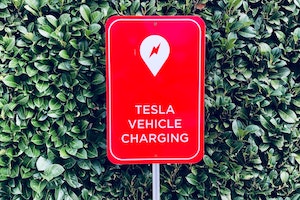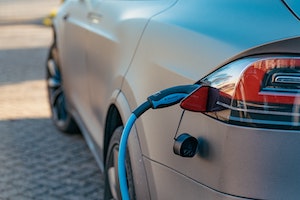One of the first questions that I had while living in an apartment and looking into getting my first electric car was what I would need to do to be able to charge my electric car if I had to park it outside rather than in a garage. So many people have the same question and are in this same situation! For some reason or another they have to charge their car with an extension cord or other outdoor charger. This also applies to the occasional trip away from home where you don’t have your efficient wall charger with you. I sum up everything I learned about how you can charge your car with an extension cord.
Can I charge my Tesla with an extension cord?
Charging a Tesla with an extension cord is possible and presents no problems as long as the cord is properly sized. When choosing an extension cord to charge your car, use as large gauge of wire as possible and the shortest extension cord you can to reach the parked car.
The main potential problem with using an extension cord to charge an electric car is:
Using the wrong size extension cord for charging your car is a fire hazard because of the high current that the car will draw and the added resistance of the extension cord can cause the cord to get hot. Using the largest size wire while keeping the extension cord run short, you will reduce the risk involved with using an extension cord to charge your Tesla.
Electric cars draw lots of continuous current while charging and most extension cords are not built to withstand so much electrical load and can heat up and cause risk of fire.
There are several factors that go into properly sizing an extension cord and determining what is safe for you to be able to charge your car so I will cover those things in this post.
Using an Extension Cord to Charge Tesla
I was hesitant to use an extension cord to charge my electric car after reading the recommendations against using an extension cord when I searched it online. But the results didn’t give me enough information of why. After lots of research and finding the answers to tough questions, I have found the true solution and hope to provide a condensed version of what you need to know in this post.
I thought I may have to wait until I own a home with a big enough garage to make room for my electric car. But, that is not the case. There are a few ways to make an extension cord work as long as the proper cord is used.
When selecting an extension cord to charge a Tesla, don’t skimp.
We try to be as budget friendly around here, but never charge your car with a cheap extension cord. Cheap extension cords use aluminum wire, small gauge wire, and thin insulation. Three things that will highly increase the likelihood of a fire from the cord.
Can I use a regular household extension cord to charge my Tesla?
A standard household light-duty extension cord is not suitable and cannot be used and is a fire hazard because the materials are not durable enough to withstand as much power as required to charge your electric car.
Here is my recommendation if you are using a level 1 charger (standard 120v plug/ Nema 5-15 outlet)
Extension Cord For Charging From a Standard (Nema 5-15) 120V outlet
This extension cord is my top recommendation if you are charging your car from a “standard” outlet in the United States. A standard U.S. outlet is technically a Nema 5-15 outlet. This cable will be the ideal fit for charging your car in those instances where the standard mobile charger is not long enough to reach.
You also have the option to order this cable up to 100 feet in length and the 10 gauge extension cord will be adequate to charge from a Nema 5-15 outlet up to 100 feet.
This is the ideal cord because it is rated for outdoor use, is made with 10 gauge copper wire, and is a tough and durable.
You will see a slowdown in charging speed by using a very long extension cord, but this linked product sells on Amazon starting at about 35$ for a 35 foot cable but gives you the option to select up to 100 feet of extension cord!
Extension Cord For 240V Charging
How about a cord for charging at 240V at a longer distance from an outlet
It can be common to come across a place at a campground or away on another trip where the outlet may just not be close enough to reach your parked Tesla.
Having a cable that can work for a 120V or 240V outlet is DEFINITELY a good idea to keep on hand.
The good part of getting a bigger cable that can be used at 240V is that it will always work for charging at 120V with the right adapter.
That way, if you ever change your charging arrangement, you will still have a charging cable that works!
This is the cable that I recommend to charge at 240V
Even take a look at the reviews and there are tons of happy customers that have purchased this extension cord and use it to charge their electric vehicle.
Best Extension Cords For Charging a Tesla
In a Standard 120V Outlet
For a 240V Outlet
If you have a 240 outlet available to you, consider spending the money to install a Wall Charger. They are extremely simple to install. Once you have the outlet you simply mount it to the wall and plug it in! This gives you 24 feet of charging cable and in most cases you will be able to get this close enough to your car.
For away from home, or for charging a car outside, a 240 volt extension cord will be needed.
If the distance is more than 50 feet then seriously consider having a 240 volt outlet installed and I do not recommend using an extension cord. But a 50 foot cord will work as long as it is a good one like this one on Amazon!
Be aware, if you do require a 240V extension cord, it is going to be thick and bulky! It has to be to charge your car safely.
Properly Size an Extension Cord for Charging a Tesla
Most often I have seen that folks are interested in charging their tesla from a standard 120v outlet. Simply because it can be difficult or near impossible to install a new 240 volt outlet somewhere near where you are planning to park your Tesla.
An extension cord becomes a necessity for several cases. Whether it is because you do not have an available outlet, or the capacity to add one, or if the outlet is too far from the charging port of the car the way that it is parked in the garage, or if it is just for the trips out of town when you will not have your perfect charging set up with you.
What people need to be aware of is that a cable that is not the right fit for the job can heat up and catch on fire when it is being used for something drawing lots of current just as is the case when charging an electric vehicle.
To prevent this from happening, you should ensure 2 things when buying an extension cord making sure it is the right size.
The general rules for sizing an extension cord to charge a Tesla or another electric vehicle are:
1. Use an Extension Cord with the Largest Wire Gauge as Possible
Within reason of course, but the larger the gauge the better.
At a minimum, to charge a Tesla plugged into a “standard” 15 amp wall outlet, using a level 1 charger, at LEAST 12 gauge wire should be used. 10 gauge wire is what I recommend but 12 gauge wire will technically work as long as the circuit is only 15 amps.
When taking into account any wear on the cord or to be used over a long distance, 10 gauge is far superior.
You can determine the wire gauge on an extension cord by reading the writing printed on the outside of the cord. The cable will say: 12AWG
AWG stands for American Wire Gauge
By purchasing a 10 gauge extension cord, you will have an extension cord that is adequate to comfortably charge your Tesla without having to worry about voltage drop (slower charging) and will not have to be concerned of a fire hazard.
2. Use as Short a Cord as Possible
The shorter the better when it comes to using an extension cord.
This is true when using an extension cord to power anything but especially for something that draws lots of power like charging an electric car.
The shorter the cord, the less resistance. And an increase in resistance is what heats up the wire causing a fire hazard.
So, to eliminate the risk of fire, make the extension cord run as short as possible. If it is not possible to make the run shorter, then use the largest size wire possible for a long extension cord run. (See rule #1)
How long of an extension cord can I use to charge my tesla?
It is not recommended to use a long cable to charge your Tesla, but it is possible to charge your Tesla successfully without issues with a 50 foot extension cord. Many owners have reported charging their cars with an extension cord and 50 gives no problem when using the right cable. Longer than 50 feet and you will have voltage drop.
Use an Extension Cord Made of Copper Wire
Cheap extension cords are often made of aluminum because it is a cheaper material. Aluminum is a good conductor, but not as good as copper, so for a power draw as heavy duty as charging an electric car, an extension cord made of copper is a must.
It is definitely worth the few extra dollars to have no risk of fire in your home. Buy the better cable. Here are the links one more time for the cable to charge 120V and 240V.
How fast will my Tesla charge with an extension cord?
Your Tesla will charge at the same rate as it does without an extension cord as long as the extension cord is properly sized and the distance is not too far. An extension cord will show a voltage drop over a long enough distance so keeping the extension cord as short as possible will allow the fastest charge possible.
Most people looking to charge their Tesla are interested in doing so from a “regular” wall outlet providing 120 volts.
Using an extension cord from a standard wall outlet, the outlet is most likely on a 15 amp circuit and will provide the battery with a charge rate of 3 miles per hour. This is adequate for most people that use their car daily for a commute to work. Using an extension cord from a 240 volt outlet you can expect 20-30 miles of range charged up nightly.
Using a standard outlet in conjunction with superchargers should be enough for someone interested in having a Tesla as a daily commuter.
Keep an extension cord with you in the car for when you go out of town. You will definitely need it as some point!


